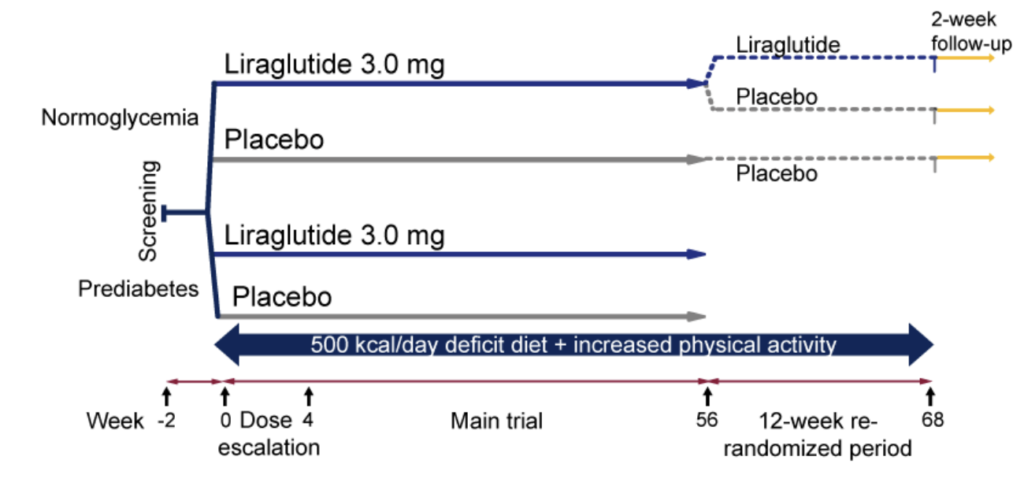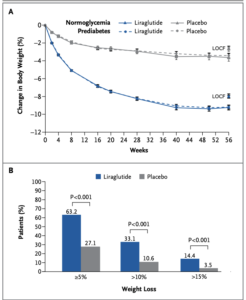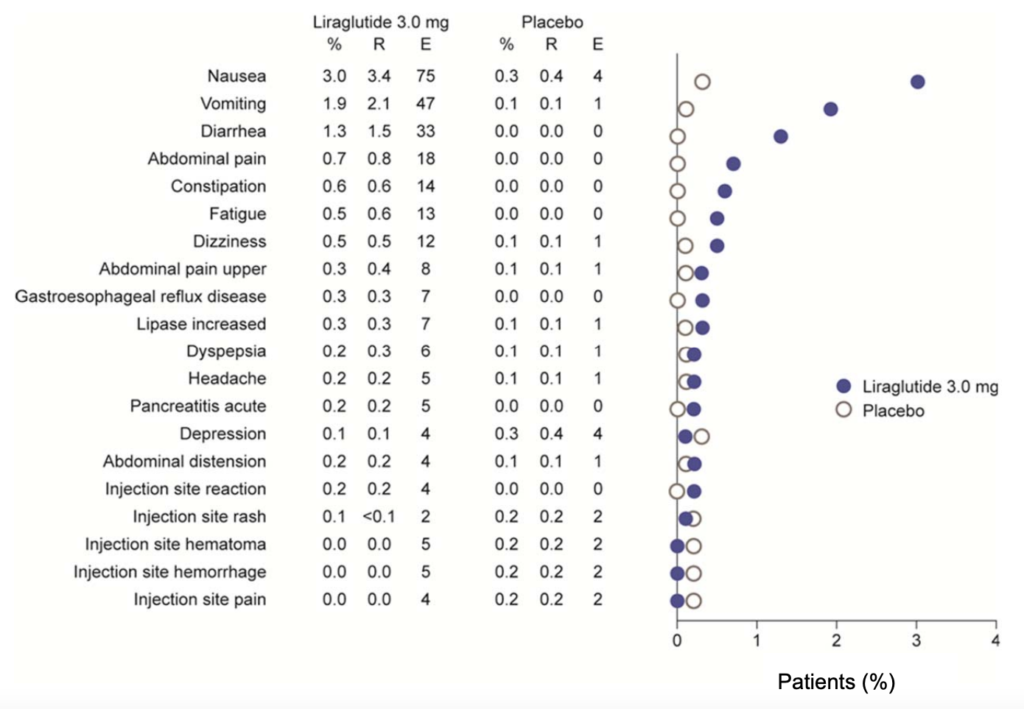Saxenda.
You’ve likely heard me talk about it before. I often mention it in the same breath as Ozempic, Wegovy, and Mounjaro. However, I never talked about Saxenda all on its own. This is odd since Saxenda was the first GLP-1 receptor agonist that gained approval for Obesity treatment and essentially spearheaded the way for everyone else.
I also want to talk about Saxenda because, given the current shortage with Wegovy, Ozempic and likely soon-to-be shortage with Mounjaro, many people are being switched to it or have had it offered as an alternative. Yet, how can you make an informed decision about using it without a detailed breakdown from moi? So, let’s get into it.
What is Saxenda?!
 Saxenda is a once-daily injectable Glucagon-Like Peptide-1 Receptor Agonist, or GLP-1 for short so that I can save precious time and my fingers from having to type all of the former out.
Saxenda is a once-daily injectable Glucagon-Like Peptide-1 Receptor Agonist, or GLP-1 for short so that I can save precious time and my fingers from having to type all of the former out.
GLP-1 is a hormone that is naturally produced by the body. When Saxenda is used, we effectively increase the amount of GLP-1 hormone that is in the body in order to enhance the effects of what GLP-1 does in the body. Very broadly, GLP-1 reduces blood sugars and acts in the brain to decrease your wanting of food and your food-seeking behaviours. The latter is how it helps us to manage our weight.
GLP-1s are a class of medications that first hit the market in 2005, and now there are a number of GLP-1 medications on the market, including Ozempic, Trulicity, and Saxenda. GLP-1’s were originally and still are developed for managing Type 2 Diabetes. However, it was noted that all these people with diabetes were not only achieving better blood sugar control, but they were also losing weight.
It’s kind of like the serendipitous discovery of Viagra – whereby a couple of fellows named Albert Wood (yes, that was his actual name) and Peter Dunn were hoping to create a molecule that could treat chest pain and blood pressure. While the data showed it wasn’t great for the original indication, a side effect that a number of gentlemen noted was that it helped with their wood-related concerns, and voila, Viagra came to market. Well, the GLP-1s have a similar story.
Perhaps you have heard of Victoza? Victoza is Saxenda. They both contain the molecule Liraglutide. They are just used at different doses and have different indications. Victoza is titrated to a dose of 1.8mg daily and used for diabetes; Saxenda is titrated to a dose of 3mg daily and is used for Obesity.
But enough about the semantics; let’s talk about the data surrounding Saxenda. In particular, we are going to review the SCALE study by Pi-Sunyer and friends (PMID: 26132939).
The SCALE Study
The SCALE Study was a large (3,700 people), double-blind, randomized controlled study that looked at the benefit of Saxenda for weight loss in individuals with Obesity. Obesity was defined as BMI >30.0 or a BMI >27.0, but they had an additional medical condition such as high blood pressure or high cholesterol. In this study, they specifically excluded people with diabetes, a previous weight-loss surgery, or who were on drugs that may cause or contribute to significant weight gain or loss.

Now, this was kind of a fun little trial, or at least what I think is fun when it comes to reading scientific papers. As you can see above, there were two groups – one took Saxenda, and the other took a placebo. Yes, it looks like there are 4 groups above as they further stratified participants if they had prediabetes – again, semantics, it is important but not for our purposes.
The main trial was for a total of 56 weeks, and what I found fun about this study is the authors did what’s called a re-randomization after the main 56-week trial. Basically, they took a smaller subset of people from the main trial and had a portion that was on Saxenda for 56 weeks switch to the placebo for another 12 weeks. They wanted to see what would happen if they abruptly stopped Saxenda for 12 weeks. Would there be safety complications? Would they gain weight or continue losing? These are the things they, and we, want to know!
As well, you can see that everyone received counselling on lifestyle modifications and was instructed to follow a diet that consisted of a 500-calorie deficit, aka they were told to eat 500 calories less than they burn each day.
Results
Ok, let’s get into the juicy stuff.

As expected, the group that took Saxenda lost weight and maintained the weight loss over the 56 weeks. In fact, they lost, on average, 8% or 8.4kg (18.5 lbs) of their baseline weight.
The placebo group lost 2.6% or 2.8kg (6.2 lbs) of their baseline weight. Not too shabby for a placebo, AND it shows that the lifestyle interventions included were adequate. Overall, this led to a weight-loss difference of 5.4% or 5.6kg.
Further, in graph B, you can see what percentage of people from each group lost 5%, 10%, and 15% or more of their baseline weight. For those that will ask, take note – there were some people in the placebo group (not taking Saxenda) that were able to lose a substantial amount of weight. Albeit, they were a significantly smaller portion – 3.5% or ~43/1244 people in the placebo group.
This shows that weight loss is possible if you are averse to medications or what have you, but it will be significantly more challenging and may or may not be sustainable long term. Just as an aside – using medications is perfectly fine! It does not mean you are weaker or a failure. Obesity is a complex chronic disease. Just like my depression, anxiety, and ADD. Sure I could manage them without the use of medications, and I could also remove caffeine from my diet again, but I am also trying this thing in 2023 where I’d like to feel happiness and joy.
Other Study Findings
A couple of other small things to point out – LOCF, what are those random little dots on graph A? LOCF means Last Observation Carried Forward. As with any study, not everyone will finish the entire study due to side effects, life events, death, and countless other potential reasons. So LOCF is an analysis that includes these people and takes their last set of data available, i.e. the last weigh-in, and then assumes that is what that person would have ended the actual study at, even if they only weighed in once.
You can see in both groups that the LOCF dot is shifted a bit higher than the dots at the end of the pretty line. The LOCF results, as expected, are not as good – they are more realistic as to what might actually happen in real life for normal people like yourself who are not partaking in a perfectly supported trial environment.
FYI: the results I shared above (loss of 8% or 8.4kg with Saxenda) were the LOCF numbers. And if you happen to be in a perfect trial environment or working with an amazing supportive coach like me, you might be able to get even better results than the LOCF dots. Closer to 9 or 10% weight loss from baseline. *Wink, Wink, Nudge, Nudge* You can book a consultation with me here.
Other honorable mentions in terms of results – participants also saw improvements in blood sugars, lipids (cholesterol), insulin resistance, and blood pressure. All things that certainly play a role in overall health!
Side Effects
Now for the not-so-wonderful – let’s talk about side effects.

The main side effects are typical of what we see with GLP-1s. They are mostly gastrointestinal (or stomach/gut) in nature – nausea, vomiting, diarrhea, cramping, and constipation. Most of these side effects are resolved in the first 4-8 weeks of being on the drugs. For managing specific side effects, check out my other articles – fatigue, nausea, constipation and diarrhea, heartburn, and hair loss.
As expected, more people in the Saxenda group dropped out of the study due to side effects. If something is giving you the runs, most people would be inclined to avoid it. Unless it’s pizza. I will tolerate diarrhea for pizza.
As for the other big scary side effects people worry about, Pancreatitis did occur more frequently in the Saxenda group. However, these were rare, and many were related to gallbladder issues (i.e. gallstones). Again, this was expected as people who lose weight rapidly (which can occur while being on one of these medications) are at a greater risk of developing gallstones. Gallstones can make your pancreas cranky to the point it causes pancreatitis.
As for cancer, rates of cancer occurred at similar rates to the placebo and were a very small portion of individuals <0.2%.
For the grand finale, what happened in those last 12 weeks?!
The Final 12 Weeks
In general, those that stayed on Saxenda continued to maintain their weight loss, only gaining 0.69% or 0.6kg (1.3lbs). Whereas the group that was switched from Saxenda to placebo gained back 2.9% of their baseline weight. So for long-term weight-loss maintenance, continuing on these drugs may be necessary! In terms of safety with an abrupt stop of the medication, no concerns were noted!
In conclusion, this was a pretty standard clinical trial with the appropriate measures and such followed to eliminate biases; the authors adequately present the data, both good and bad, seen with Saxenda. What we can say is that Saxenda is effective, leading to ~8% weight loss from baseline. We consider a weight loss of >5% to be significant and lead to improvement in overall health. A loss of 8-10% is similar to what I have seen in practice.
Of course, there are outliers who I have seen lose even more. GI side effects, to some degree, are likely for most people. In practice, I can say that the side effects people experience are much milder and short-lived than what I see with Ozempic!
So if you are struggling to find Wegovy, Mounjaro or want an effective weight loss medication, Saxenda could be an option.
That’s it. That’s all!
References:
https://www.nejm.org/doi/full/10.1056/nejmoa1411892
—
If you have any questions feel free to reach out. If you got some benefit out of this article, feel free to share it with a friend. Otherwise, always remember that small tweaks lead to massive peaks!
Until next time.
 Dr. Dan
Dr. Dan
Follow me on social media for regular updates – @TheOfficialDrDan
Subscribe to my newsletter for a heads-up on all new content.
Sharing is caring! Here’s the link for social, email, and even text – https://healthevolved.co/saxenda-101
If you need some coaching support on your weight management journey, you can book a consultation with me to see if you’d be a good fit for our program.
Questions or comments? Please send them my way on our Contact Us page!


 Dr. Dan
Dr. Dan



